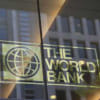More competitive market economy stressed by WB
The World Bank (WB) has stressed the need for a well-functioning competitive market' to promote sustained development in developing countries like Bangladesh. Highlighting the conclusions of its World Development Report 1991. The WB resident mission chief Christopher R Willoughby said on Monday that the government could do best to its country's success by ensuring that markets work well". "Without this, other government's actions for development cannot be very effective**. he noted. Briefing newsmen, he said the domestic market, especially in a small country like Bangladesh, cannot be efficient without the competition that results from a high degree of integration with the international market. "Efficient markets attract foreign investment which boosts productivity. At the same time, trading links to the outside world allow these countries to pursue international comparative advantage that helps the domestic economy use its resources even more efficiently", he added. This is illustrated by an analysis of about 1200 development projects of all sorts, supported by the World Bank and International Finance Corporation (IFC) in developing countries, he mentioned.
The WB Mission Chief noted that the report, with its theme on the challenge of development, was based on experiences of all developing countries over the last thirty years. "It is the fruit of a year's work by staff members of the World Bank in Washington". he observed. Willoughby stated that the conclusion of the report was consistent with the government's diagnosis of Bangladesh's needs-. "From its party manifesto to the Finance Minister's Budget Speech the popularly elected government of Begum Khaleda Zia has repeatedly stressed its commitment to dynamic market economy and reinvigoration of the private sector, he mentioned in this connection. lie termed the government measures to rationalize the public Investment programme resolve a prolonged dispute between Power Development Board (PDB) and Rural Electrification Board (RED) over rural distribution lines. step up efforts to recover loans from long-standing defaulters. and introduce the ' first stage of a modern Value Added Tax (VAT) as 'important concrete steps'. The government. he noted. has also successfully resisted pressures to roll back crucial reforms initiated in earlier months. he commented. Willoughby observed. 'Twenty years of regulation and protection and ten years of autocracy have built up many groups benefiting from privileges and favours inconsistent with the national interest'. He observed that initial democratic governments, following periods of autocracy. faced difficulties and often failed to sustain needed reform programmes. Opposition to reforms is not unexpected but 'a government faced with such a situation has to take a strong lead', he saw. The World Development Report 1991. he said, also points out that governments committed to addressing their societies' problems have rarely lost power because of this determination. The Wf3 mission chief noted that the more successful reforming governments in other parts of the world have made major efforts to convince the public of the costs of Inaction and to explain the thinking behind their reforms'. One step in Bangladesh might be for the Prime Minister to• lead the shaping of 'a consensus within her new cabinet around a vision of the kind of society Bangladesh should have and the economic reforms necessary to get there.' he suggested. Reforms should be spelt out more concretely to convince the people and the officials. About the Report. the Wf3 mission chief said that its findings showed that only half of developing countries' economic growth could be attributed to accumulation of capital stock, and the factor distinguishing fast growers from slow was productivity. "Productivity in turn Is the combined result of improvements in human capacities (education I and the quality of the economic environment or market in which people apply their capacities. he added. Replying to a question. the WI) mission chief said that some public sector units would operate while others would close clown because of the reforms. Reforms relate more to the environment in which the units operate and not essentially who run them. he added. When asked about the alternative employment opportunities for those who would lose Jobs. he maintained that a vibrant economy with new Investments. facilitated by withdrawal of support from loss-making units or closure of unviable units. would open up new employment opportunities. Responding to another question. Willoughby said that the Bank commended the privatisatlon efforts in the early eighties in Bangladesh only in terms of the scale of operations only. The Bank was critical of deteriorating macro-economic performances in Bangladesh in the latter part of the eighties. he added.

 For all latest news, follow The Daily Star's Google News channel.
For all latest news, follow The Daily Star's Google News channel. 








Comments